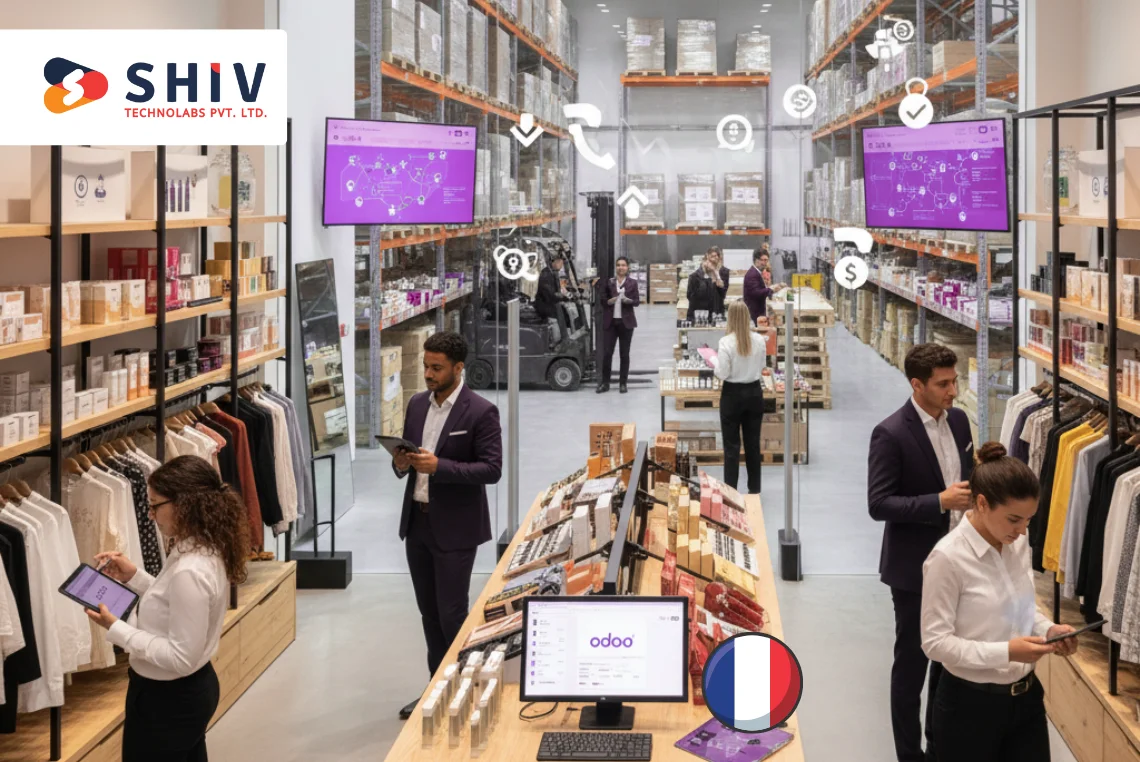Table of Contents
Retailers in France deal with tight margins, rising costs, and changing shopper behavior across online and offline channels. Many now turn toward Odoo for retailers and custom Odoo module development services in France to keep stock under control and support growth.
Local chains and independent stores face real pressure when their systems show the wrong stock, slow price updates, or delayed store data. With the right setup, Odoo ERP solutions in France give retailers a flexible platform that supports daily operations and long-term planning. It brings sales, stock, and finance into one connected view so teams spend less time fixing errors.
However, most retailers do not work with a standard setup. They need France-specific tax rules, regional pricing, and store formats that match their real retail workflow. That is why custom Odoo work matters so much for chains and growing brands. In this blog, you will see how Odoo improves stock accuracy, supports multi-store operations, controls costs, and grows with custom features designed for retailers in France.
What Challenges Do Retailers in France Face With Stock Accuracy and Multi-Store Coordination?
Retailers in France often work with several systems that do not share data in real time. One tool runs the store counter, another manages eCommerce, and a third handles purchasing. When these tools do not match, teams guess instead of trusting their figures. This weak base creates wrong stock levels, missed sales, and frustrated store staff.
Chains with two or more locations face even more confusion. One branch may show ten items, another shows zero, while the warehouse still displays old numbers. Without a single source of truth, managers cannot see which store needs stock first. Odoo inventory accuracy for retail businesses in France becomes crucial when brands want clear decisions rather than daily stock firefighting.
Common pain points include:
- Stock numbers that differ between the point-of-sale, warehouse, and online store
- Slow updates when one store sells an item that another store has already reserved
- Manual spreadsheets that staff update at the end of the day or week
- Limited visibility into which products move fast in each French region
- Difficulty planning promotions because stock figures feel unreliable
When these problems repeat, staff lose time fixing mistakes instead of serving customers. Retailers start looking for a single Odoo-based system that tracks stock correctly, connects all stores, and gives managers a real view of their business in France.
How Does Odoo Help Retailers Manage Multiple Stores in France Effectively?

Odoo helps retailers in France manage several stores by keeping every branch on one shared system instead of separate tools. When you see the same stock, price, and sales data for each city, daily work becomes easier and less stressful. That is how Odoo helps retailers manage multiple stores in France without losing control as locations grow.
With Odoo modules for retailers in France, the head office controls products, tax rules, discounts, and campaigns from a single back office. Store teams receive up-to-date information without manual files or late updates. Buyers can send stock to the right store based on current figures instead of guesses. This setup supports chains that want clear data and steady growth across French regions.
How Does Odoo Centralize Stock Data Across Store Locations?
Odoo keeps stock information for every French store and warehouse in one real-time database. A sale, return, transfer, or new delivery updates the same record as soon as staff confirm the action. Managers no longer chase numbers from separate systems or ask branches to send custom reports.
They open one screen and view quantities, reservations, and incoming shipments for all locations. This central view helps them plan transfers, purchasing, and promotions with more confidence and less manual work.
Why Is Odoo’s Multi-Store Dashboard Valuable for Retailers in France?
The multi-store dashboard answers everyday management questions in a few seconds. Leaders see which stores perform well, where stock feels risky, and which items drive profit. They spend more time acting on insights and less time building reports.
Typical dashboard insights include:
- Stock on hand by store, warehouse, and product group
- Best-selling items by region, season, or campaign period
- Low-stock alerts with suggested reorder levels
- Revenue and margin by branch or sales channel
- Open transfers, purchase orders, and pending receipts
How Does Store-to-Store Stock Movement Work in Odoo?
In Odoo, internal moves between stores follow a clear and traceable process. Staff raise a transfer request, pick items at the source, and record receipt at the destination branch. Each step updates quantities automatically, so both locations see accurate figures.
Retailers in France use this process to balance stock between busy and quiet stores without losing track of items. They cut emergency supplier orders, support more stable shelf availability, and keep shoppers happy across their store network.
Which Odoo Retail Features Improve Stock Accuracy for Businesses in France?
French retailers need stock figures they can trust before they place orders, plan campaigns, or promise delivery dates. Odoo for retailers connects sales, purchasing, warehouse, and point-of-sale activity in one place, so every team works with the same data. That shared picture reduces confusion and supports better planning at both local and national levels.
Over time, Odoo inventory accuracy for retail businesses in France improves because every movement links to a clear document. You can see how items entered the business, where they moved, and when they left. That history helps audit teams, guides buyers when they review ranges, and reduces write-offs from missing or wrongly counted goods.
How Do Automated Inventory Updates Reduce Errors?
Odoo updates stock when real work happens, not when someone remembers to change a sheet. A confirmed sale, accepted return, goods receipt, or internal transfer all change quantities straight away. Staff do not spend evenings fixing figures or trying to match several reports.
This approach reduces typing mistakes, forgotten updates, and double-counting. Your team starts each day closer to accurate numbers and spends more time with customers instead of correcting records.
Also Read: Inventory Automation in Manufacturing: How Odoo ERP Simplifies Stock and Procurement
How Does Odoo Improve POS and Back-End Stock Matching?
The point-of-sale and back-end inventory share the same database in Odoo. When a cashier finishes a sale, the system reduces stock for that product at that exact location. There is no risky delay between the counter and the warehouse view.
Retailers avoid selling items that no longer exist in the stockroom and reduce awkward conversations with shoppers. Staff trust what they see on the screen because it reflects real movements, not yesterday’s export.
What Real-Time Tracking Features Enhance Accuracy?
Real-time tracking tools in Odoo make stock control part of daily operations rather than a rare task. Helpful tools include:
- Detailed movement history by product, date, user, and store
- Batch and lot tracking where expiry dates or rules apply
- Barcode support for receipts, transfers, and cycle counts
- Livestock valuation by location, category, and product line
These features support tighter control, fewer surprises, and a stronger base for growth for retailers in France.
How Do Retailers in France Benefit From Odoo’s Cost Management Tools?

Retailers in France deal with tight margins, rising supplier prices, and growing staff costs across many locations. When numbers sit in separate systems, decisions on pricing, promotions, and stock levels often rely on guesswork. This is where Odoo cost management for retailers helps, because it connects daily operations with clear financial insight.
Odoo ERP solutions in France link sales, purchasing, inventory, and accounting in one shared system. Retailers see which stores, product lines, and channels bring real profit rather than only revenue. Teams adjust buying plans, discount depth, and promotion timing based on facts, not late spreadsheets or rough estimates.
For groups with several French brands or entities, Odoo also supports local tax rules and group reporting. Leaders compare performance by store, city, or concept and move budget toward the strongest ideas. The result is a clearer view of costs and faster action when something begins to harm margins.
How Does Odoo Reduce Operating Costs for Retail Chains in France?
Odoo reduces operating costs by cutting repeated work and extra tools across stores, warehouses, and the head office. Staff enter data once, and the same record supports purchasing, inventory, sales reports, and accounting. This saves time every day and lowers the chance of expensive mistakes in key processes.
Better stock accuracy brings direct savings too, because retailers avoid panic orders and emergency shipping fees. Chains carry the right level of stock instead of filling back rooms with slow-moving items. Teams also lose fewer products through counting errors or weak tracking between stores and warehouses.
Which Financial Tools Support Better Cost Control?
Odoo includes financial tools that match retail needs instead of feeling like a separate world. Finance teams and retail leaders see the same dashboard numbers and discuss issues using shared facts. This shared view makes cost discussions faster and more practical for everyone involved.
Important tools inside Odoo for cost control include:
- Margin reports by product, category, store, and channel
- Budget plans with variance reports against real figures
- Cost center and analytic accounting for departments or projects
- Integrated billing and supplier invoice follow-up status
- Cash flow and aging reports that highlight late payments
What Is the Cost of Odoo Implementation in France for Retailers?
Many retailers ask the same first question: What is the real cost of Odoo implementation in France? The honest answer is that cost depends on store count, process complexity, and the level of customization. You also need to include data migration, training, integrations, and long-term support in your budget.
The ranges below give a starting point for French retailers planning an Odoo project:
| Retail Requirement | Estimated Cost Range | Notes |
|---|---|---|
| Basic Odoo retail setup | €4,000 – €8,000 | Suitable for small stores |
| Multi-store implementation | €8,000 – €20,000 | Sync + dashboards |
| Advanced integrations | €5,000 – €15,000 | eCom, logistics, finance |
| Custom retail features | €2,000 – €10,000 | Based on complexity |
Actual figures can sit below or above these ranges depending on your goals and technical landscape. Deep changes to point of sale, warehouse rules, loyalty programs, or online channels usually add extra work. Integrations with French accounting tools, payment providers, or logistics platforms also affect the final budget.
The best approach is to discuss scope, timeline, and growth plans with an experienced Odoo partner in France. They can propose a phased roadmap that brings early value and keeps later expansion open for the future.
Why Do Retailers in France Prefer Custom Odoo Enhancements for Their Retail Workflow?

Standard Odoo setups already help, but many French retailers want workflows that match their real store routines. They might run loyalty schemes, regional pricing, or sector rules that basic settings do not cover well. That is where custom Odoo module development France comes in.
The benefits of Odoo for France-based retailers in France grow when they add features built around local habits and regulations. Custom modules support France-specific tax rules, ticket formats, label layouts, and discount structures. Retailers gain speed and clarity without forcing staff to change every habit overnight.
Good Odoo module integration in France also means every new feature works smoothly with POS, inventory, finance, and eCommerce. Instead of switching between tools, teams work inside one familiar system. That approach supports staff adoption and keeps daily store work simple and clear.
How Do Custom Features Support France-Specific Retail Rules?
French retailers must respect local tax rates, document formats, and sector rules. Custom features can match ticket layouts, price display laws, and legal mentions that apply in France.
Custom Odoo settings also support different rates or eco taxes per category or product line. Staff work faster because screens and reports reflect real compliance requirements, not generic templates.
Why Do Retailers Need Additional Inventory or POS Enhancements?
Many French chains need more than standard POS and stock screens. They may manage reservations, vendor corners, or special offers for local events. Extra screens or flows can support these needs.
Custom inventory rules can guide store staff during stock counts, transfers, or returns. This approach reduces confusion, protects margins, and keeps data closer to real life in each branch.
How Does Integration With Local France Software Improve Retail Operations?
Retailers often run tools for accounting, loyalty, or logistics that already work well in France. Connecting these systems to Odoo reduces retyping and errors.
Common Odoo module integration in France cases include:
- French accounting and reporting software
- Local payment gateways and card processors
- Last-mile and parcel carriers active in French cities
- Loyalty or CRM tools used by French retail brands
These links help retailers keep their preferred partners while still building Odoo as the central platform.
How Can Tailored Odoo Add-Ons Improve Multi-Store Operations in France?
As French retailers grow, they often add new store concepts, corners, or sales channels. Standard Odoo features give a strong base, but add-ons can support the special needs of each format. Custom Odoo work keeps data in one place while giving each concept a better daily flow.
With custom Odoo module development in France, chains can introduce rules for stock transfers, regional assortments, and local promotions. They set different ranges per store type while still controlling everything from the head office. Multi-store management becomes clearer because each add-on supports a real situation, not a theory.
Which Custom Retail Add-Ons Are Most Popular in France?
Popular add-ons in French retail often support both the head office and store teams. They turn repeated manual tasks into guided flows inside Odoo.
Typical examples include:
- Advanced promotion and coupon engines for French campaigns
- Regional assortment and pricing control by store cluster
- Loyalty and gift card modules linked to POS and eCommerce
- Vendor corner or consignment stock management
- Extended stock transfer rules with approval steps
How Do Retailers Upgrade Their Odoo System Over Time?
Most retailers in France prefer a phased approach instead of one huge project. They often start with core sales, inventory, and accounting, then add custom features in waves.
After each phase, teams review results and gather store feedback. Retailers then adjust existing modules or add new ones. This steady growth keeps risk low while building a tailored Odoo setup over several cycles.
How Does Odoo Compare to Other Retail Software Options in France?
French retailers often compare Odoo with classic POS systems and general ERPs. Standard tools might support basic checkout but lack deeper multi-store control. Others may handle finance well but feel heavy for store teams.
With Odoo ERP solutions in France, retailers gain a modular system that covers POS, inventory, purchasing, and finance in one place. Custom modules and add-ons then push it closer to each brand’s real way of working.
Below is a simple comparison view:
| Aspect | Odoo ERP | Legacy POS + Spreadsheets | Generic ERP Suite |
|---|---|---|---|
| Features | Retail + back office | Basic POS only | Strong finance focus |
| Cost | Mid, modular | Low at first, high later | High license and service |
| Flexibility | High with custom apps | Low | Medium |
| Multi-store | Built-in, central view | Weak, per-store data | Possible, often complex |
| POS | Integrated with stock | Standalone | Add-on or external |
| Stock accuracy | Strong with one system | Often poor | Depends on setup and links |
This mix of features and flexibility makes Odoo attractive for French retailers planning growth.
How Can Retailers in France Choose the Right Odoo Partner?
Choosing the right partner may matter as much as choosing Odoo itself. Retailers should work with a team that understands French retail rules, store life, and eCommerce habits. The right partner guides scope, budget, and rollout speed.
Look for experts who treat Odoo module integration in France as a long-term journey, not a short job. They should support initial launch and later upgrades while keeping stores working smoothly.
Key points to check include:
- Localization expertise for French tax and legal needs
- Retail-specific Odoo experience with real store projects
- Ability to build and maintain custom features
- Strong support and response after go-live
- Experience with multi-store and multi-channel setups
A partner that meets these points will help French retailers grow on Odoo with less risk and confusion.
Conclusion
French retailers choose Odoo, often with Shiv Technolabs as their implementation partner, because it supports accurate stock, clear multi-store control, and better cost visibility. One connected system replaces scattered tools, so teams trust the numbers they see each day.
Custom modules and strong Odoo module integration in France add local rules, advanced promotions, and store processes that match real life. By working with an experienced Odoo module development company like Shiv Technolabs, brands turn Odoo into a central platform that fits their style, not just a generic theory.
If you run retail stores in France and want stronger control over stock, stores, and costs, now is a good time to act. Request France-focused Odoo customization services from Shiv Technolabs and shape a system that supports your growth across every location.
FAQs
1. How does Odoo help retailers in France manage multiple store locations?
Odoo links every store to one shared database. Managers see real-time stock, sales, and transfers for each location, which supports faster decisions and better multi-store planning.
2. Does Odoo improve stock accuracy for retail chains in France?
Yes. Odoo records each sale, return, receipt, and transfer as a clear movement. This structure supports more accurate counts, fewer stockouts, and better planning for French retail chains.
3. What custom Odoo features are most useful for retailers in France?
Useful custom features include advanced promotions, local tax rules, loyalty programs, vendor corner modules, and regional assortments. These options align Odoo with France-specific retail habits and customer expectations.
4. How much does Odoo implementation cost for retailers in France?
Costs vary with store count, modules, integrations, and custom work. Smaller retailers pay less, while complex multi-store groups invest more. A discovery phase helps define a realistic and staged project budget.
5. Can retailers integrate France-specific software with Odoo?
Yes. Odoo can connect with French accounting tools, payment gateways, logistics carriers, and loyalty platforms. These integrations reduce manual work and keep data aligned across your core retail systems.
6. Why do retailers in France prefer customized Odoo solutions?
They prefer tailored setups because standard systems rarely match every process. Customized Odoo solutions support local rules, brand identity, and growth plans while keeping operations inside one main platform.























